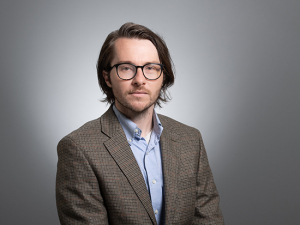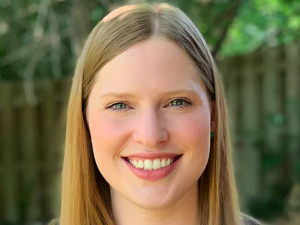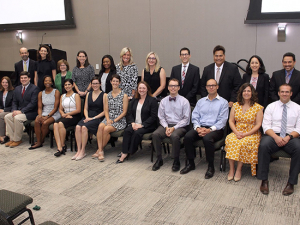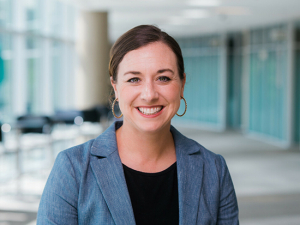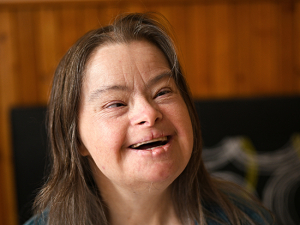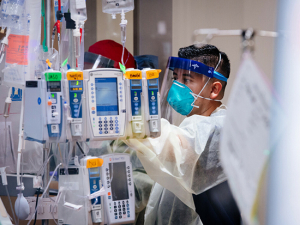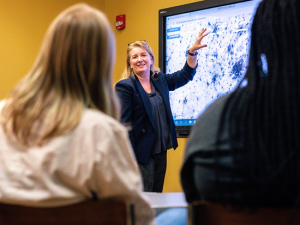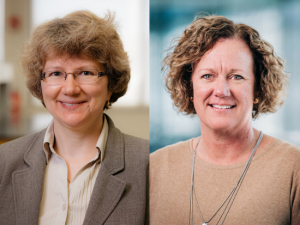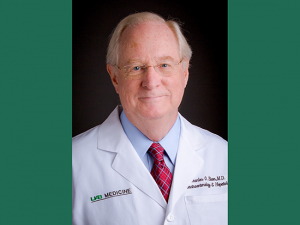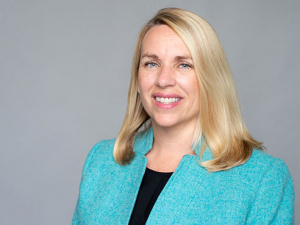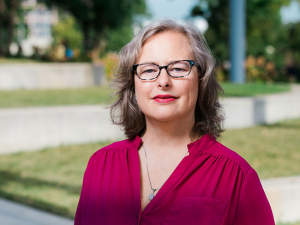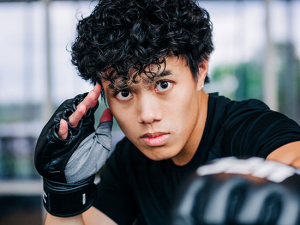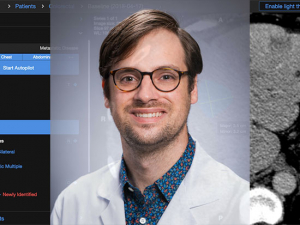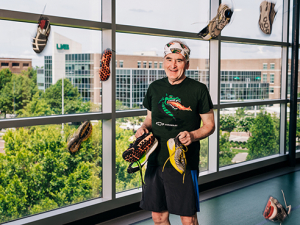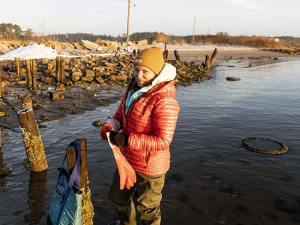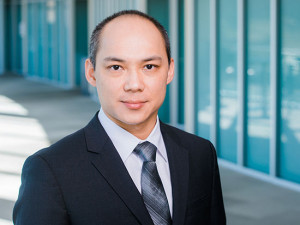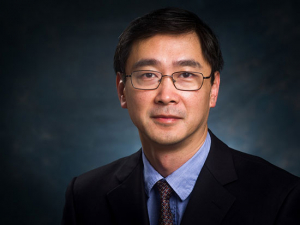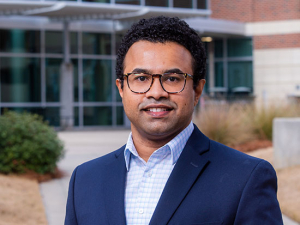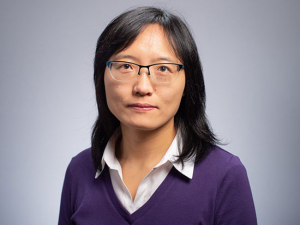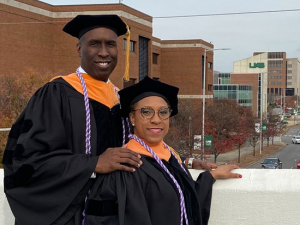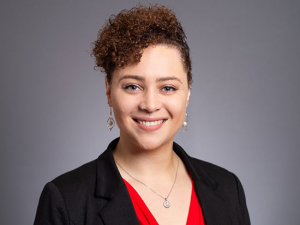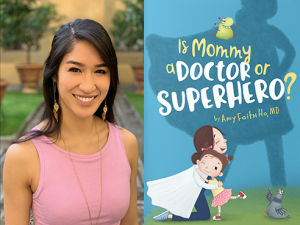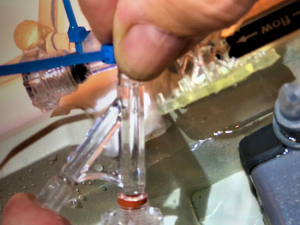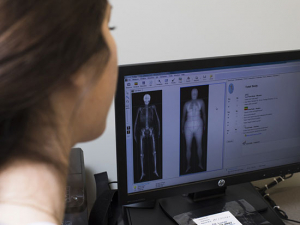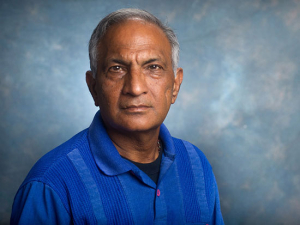 Biology Associate Professor Sami Raut, Ph.D., who has mentored nearly 40 students and recently earned a national award from the Council on Undergraduate Research, offers six tips on mentoring undergraduates in STEM.
Biology Associate Professor Sami Raut, Ph.D., who has mentored nearly 40 students and recently earned a national award from the Council on Undergraduate Research, offers six tips on mentoring undergraduates in STEM.
Photo by ANDREA MABRY | University RelationsFinally, after all those sweaty days chasing dragonflies through the wetlands of central India, 19-year-old Sami Raut, a nervous undergraduate, is ready to give her first conference talk. And then, only a few slides into her presentation, the power goes out.
“That is not uncommon in India,” recalled the modern-day Raut, now Samiksha Raut, Ph.D., an associate professor in the Department of Biology at UAB. For a college student, aiming to excel in a place and time when boys majoring in engineering got all the attention, this was not an auspicious beginning. But Raut had practiced the presentation so many times with her mentor at Hislop College, Professor Raymond Andrew, Ph.D., that she plowed ahead. “It was a nerve-racking experience; but I kept speaking, even without the slides,” Raut said. “The crowd was mesmerized because I knew the presentation so well. With that one presentation, my confidence soared, and the next thing I knew was that I loved research.”
Raut saw how Andrew was able to travel to lecture on Indian dragonflies in the United States and Europe. “I was looking to broaden my horizons,” Raut said. “Girls were supposed to finish their education and then settle down. Only boys from engineering went to the United States — and they all had a certain ego as well. I didn’t find any other girls to talk to. I wasn’t interested in research before I met him. But he was very creative about finding ways to do research, even when there are no funds available. He showed me there was a way out. And I was the first girl from my campus to make it to the United States.”
In the early 2000s, Raut made it to UAB, where she earned her doctorate in biology and then joined the faculty ranks — a path that grew directly from her undergraduate research efforts. Along the way, she discovered that she enjoyed teaching and exchanged her research on animal habitats for a larger question: What is the best way to make sure all students can succeed in college biology?
“I have made it my professional goal to use my privilege to uplift and empower my students through teaching and, most importantly, through undergraduate research endeavors."
The introductory courses Raut teaches are key gateways to a science or allied health career. But many students who come into college interested in those careers find their dreams derailed by their first taste of college science courses. “I have made it my professional goal to use my privilege to uplift and empower my students through teaching and, most importantly, through undergraduate research endeavors,” Raut said. She has introduced several innovations, including peer mentoring programs, that have contributed to student success. Her own research is dedicated to studying outcomes and finding ways to improve.
This summer, Raut was one of four biology faculty nationwide to receive a mentorship award from the Council on Undergraduate Research. (Raut received the award for early career faculty.) “I feel like this is a dedication to all of my students who have worked with me, nearly 40 so far,” she said. This is only the latest mentoring award for Raut. In March, she was honored with the inaugural Adriel D. Johnson, Sr. Mentoring Award from the Alabama Academy of Science and the Provost award for Faculty Excellence in Undergraduate Research at UAB. Last spring, she was selected to receive the 2022 research award for Outstanding Faculty Contributions to Service-Learning in Higher Education by the Gulf-South Summit on Service-Learning and Civic Engagement Through Higher Education.
After getting the news of this latest award, Raut reached out to her own undergraduate mentor. “He is now retired; but if I have achieved something, he is the first one to know,” Raut said. “He really taught me how to teach and write and become involved in research.” That is a sentiment shared by Raut’s own mentees. One of her nominators for the Council on Undergraduate Research award was Sebastian Schormann, M.D., who just graduated as the valedictorian from the UAB Heersink School of Medicine and began his residency in internal medicine at the University of California, San Francisco.
“I hope that one day I can have the same long-lasting impact on my mentees as she had on me,” Schormann wrote. “As an underrepresented minority student in her class, I remember feeling recognized and validated through the stories she would share about her own struggles as an immigrant and a woman in STEM …. After I finished her courses, she reached out to me to join her on her education-focused research projects. She told me that she had sensed my new educational aspirations and thought joining her would help me advance my career in education. At that point, I had no experience in academic research; but with her guidance over the next five semesters, I developed the full gamut of research skills, from project design to presentation and publication. She constantly encouraged me to push myself further.”
Raut’s success sparks an obvious question: How does she do it? The Reporter put this question to Raut; here is what she told us.
"I let them know from my own life that good research training can empower your future."
1. Know your mentees well
“In my very first meeting, I try to get to know everything about the student,” Raut said. “Why are they here? Was it a high school teacher or a parent who inspired them? Each of them has a unique story. The type of research I do is very different from the typical bench science research for many of them. I let them know from my own life that good research training can empower your future. Asking them a lot of questions when you begin with them gives you a deeper insight into their life and the challenges they will face in the future. And enabling them to grow beyond these barriers is something that I have enjoyed doing.”
"Any feedback you give has to be very positive and yet constructive."
2. Practice mindful motivation
“You have to learn how to deliver constructive feedback in a very positive way, because some of these students have never received that kind of feedback,” Raut said. “Learning how to motivate them without cutting them off was a real challenge for me. Many of my students are first-generation, and a huge proportion are from underrepresented minorities. Any feedback you give them has to be very positive and yet constructive.”
The last part of that formula is as important as the first. To succeed in a competitive environment, students need to be constantly improving, Raut says. She hammers on the importance of time-management skills and teaches her mentees to build a weekly calendar in advance. “My students always tell me I was a stern mentor with them,” she said. “I will have them edit their posters several times. We work hard on their writing as well. I want them to understand that simply being good at research is insufficient if you cannot communicate it well. If my students are attending conferences, I teach them active networking skills and how to leverage those networks to help advance their professional careers. I tell them this is the essence of going to graduate school, that someone is going to mentor you and teach you.”
"I have had other students who had never traveled internationally before and got to go to England for a conference. That can be a complete game-changer."
3. Always keep the outcome in mind
“I always want my mentees to see an outcome,” Raut said. “That may be a publication or a grant. The majority of my mentees are published with me. And receiving a student grant gives them ownership over their projects.” These accomplishments will help, no matter what career her students end up going into, Raut says. She also encourages her students to apply to present their work at conferences, which can have life-changing results, she adds.
Raut recalls a Hispanic student who had not been exposed to many Hispanic role models in academia. "Finding a conference like SACNAS [the annual meeting of the Society for Advancement of Chicanos/Hispanics and Native Americans in Science], where this student got to see thousands of students who look just like her, was so eye-opening," Raut said. "She came back stunned and inspired. I have had other students who had never traveled internationally before and got to go to England for a conference. That can be a complete game-changer.”
"My undergraduate mentor always told me the sky is the limit. ‘You can dream as big as you want,’ he said, ‘because dreams are free. But if you want to dream big, you have to back it up with hard work and discipline and perseverance.’"
4. Urge students to fight for their dreams
“Remembering what my mentors told me has played a very critical role in how I train my own students,” Raut said. “My undergraduate mentor always told me the sky is the limit. ‘You can dream as big as you want,’ he said, ‘because dreams are free. But if you want to dream big, you have to back it up with hard work and discipline and perseverance.’ I tell my students, ‘Apply to everything you see.’ If they are applying to a conference in Australia, they already think they are going. They don’t realize how much competition exists. You never know where you
"It took me a lot of counseling sessions to finally convince her that she was genuinely smart and could achieve what she wanted in her life."
5. Never stop winning
“Many of my mentees have suffered from impostor syndrome,” Raut said. “I tell them how I cured myself of that: Visualize yourself winning. If you do that, you are already halfway there.”
This is not necessarily an easy process. One of her former students, an African American woman with the goal of going to medical school, came to UAB from an underserved high school in Tennessee. “She worked hard to earn good grades, but she suffered from some of the worst episodes of impostor syndrome I have seen,” Raut said. “That influenced her to overthink everything she undertook, and of course robbed her of confidence.”
Raut shared her own story and her strategies for silencing those doubts. “It took me a lot of counseling sessions to finally convince her that she was genuinely smart and could achieve what she wanted in her life,” Raut said. But that student, she notes proudly, graduated from UAB with top honors, was her first student selected to present their research at the “fiercely competitive” Posters on the Hill competition in Washington, D.C., and is now in her first year of medical school.
"If you want lifelong colleagues, they will only keep in touch with you if you have made an investment."
6. Mentors have to mean it
“It is a major time investment; there is no way around that,” Raut said. “If you just want a line on your CV, it isn’t that hard. But if you want lifelong colleagues, they will only keep in touch with you if you have made an investment. The reward is that you are training your future colleagues and, possibly, future collaborators.”
Today, “as my mentees get ready to embark on their own professional journeys, I always remind them to pay it forward,” Raut said. Most have already had some experience. “I try to provide my research students with peer-leader teaching opportunities and assign them to help mentor incoming research students. I firmly believe that this enables them to build their leadership and communication skills.”

